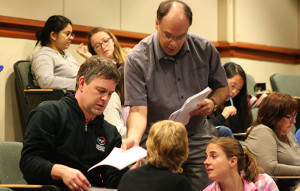Rick Moog Gives a Moving Presentation on POGIL
“The first thing we are going to do is move,” said Rick Moog, professor of chemistry at Franklin and Marshall College and director of The POGIL (Process-Oriented, Guided-Inquiry Learning) Project, at the start of his November 17 talk on POGIL. Moog, an internationally known leader in collaborative, student-centered learning, is spending his sabbatical year at The Center for the Integration of Cognition, Learning and Education (CIRCLE) at Washington University.
Moog opened his talk with a demo of POGIL, asking participants to organize themselves into groups of three with set roles—“manager,” “spokesperson,” “encourager”—to collaborate on worksheets of basic calculus problems. (One participant remarked on the novelty of the role of “encourager” in STEM, noting that this designation makes explicit a requisite element of a collaborative culture.)
After the group work, Moog explained the two pillars of POGIL—“process-oriented” and “guided-inquiry”:
- Process-Oriented: The POGIL approach involves students in group work that is designed to develop process skills such as information processing, critical thinking, problem solving, communication, management, and assessment.
- Guided Inquiry: POGIL is informed by constructive theories of learning, which define learning as inherently social. POGIL activities employ a three-phase learning cycle: Exploration, which includes a series of guiding questions; Invention, in which students develop concepts; and Application, in which students apply and test the concept in a new situation.
 Part of the power of POGIL is that learning is more visible—the instructor can see students working through problems and thinking aloud. “The student default mode in POGIL is engagement,” Moog remarked.
Part of the power of POGIL is that learning is more visible—the instructor can see students working through problems and thinking aloud. “The student default mode in POGIL is engagement,” Moog remarked.
Moog presented data on the effectiveness of POGIL in improving student performance in STEM courses. He then described the POGIL project, giving examples of POGIL practitioners working across disciplines in the US and around the world.
Moog’s talk drew 90 participants, including faculty from biology, physics, psychology, chemistry, and engineering, as well as undergraduate, graduate students, and postdocs.
Professor Moog has given permission for a video of the talk to be available for viewing by Washington University faculty, students, and staff. This video may not be distributed or disseminated beyond Washington University audiences.
Note: When the new window opens, click the Authenticate button and then log in with your WUSTL Key. The video contains a brief segment that lacks audio, starting at 27:00 minutes and ending at 30:19. Viewers can fast-forward through that segment.
Moog’s talk was the first in a new series, Innovations and Evidence-based Pedagogies in Undergraduate STEM Courses, sponsored by The AAU STEM Education Initiative project team, CIRCLE, and The Teaching Center. Upcoming speakers in the AAU series include:
- February 4, 2016: Stephen M. Kosslyn, Psychology, founding dean of The Minerva Schools. Kosslyn is one of the world’s foremost cognitive scientists, having made fundamental theoretical and empirical contributions to the understanding of the cognitive and neural bases of mental, or visual, imagery in human cognition.
- Fall 2016 (date to be determined): Julie Stanton, Assistant Professor, Department of Biology, University of Georgia. Stanton will discuss her research on metacognition, as well as practical ways to help students develop metacognitive skills so that they can be more effective learners.
